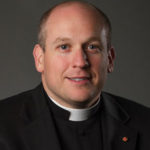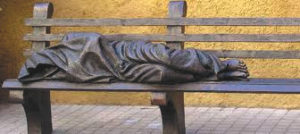 This past weekend I had dinner with one of my closest friends, meeting up with him at after a conference he was presenting at. It’s one of those friendships where we’ve seen each other at our best and our worst; one of those bonds where you can speak without words. I always had a second home with his family in Iowa. I stood up for him at his wedding, baptized two of his children, and I’m godfather to his middle son, Callum…you get the picture. In the course of dinner, sitting at a sidewalk table outside of the restaurant, there was a gentleman who appeared to be homeless as well as suffering from a form of mental illness. He was sitting down on the sidewalk about five or six feet from our table, talking to himself and smoking, but not causing any disturbance. My friend said we should move tables and I responded by asking him “what if that man is Jesus Christ?” My friend didn’t say anything to me but the look that he shot me clearly said “don’t try to play that card with me.” I smiled and laughed and we stayed at our table and the gentleman five or six feet from us moved on a few minutes later.
This past weekend I had dinner with one of my closest friends, meeting up with him at after a conference he was presenting at. It’s one of those friendships where we’ve seen each other at our best and our worst; one of those bonds where you can speak without words. I always had a second home with his family in Iowa. I stood up for him at his wedding, baptized two of his children, and I’m godfather to his middle son, Callum…you get the picture. In the course of dinner, sitting at a sidewalk table outside of the restaurant, there was a gentleman who appeared to be homeless as well as suffering from a form of mental illness. He was sitting down on the sidewalk about five or six feet from our table, talking to himself and smoking, but not causing any disturbance. My friend said we should move tables and I responded by asking him “what if that man is Jesus Christ?” My friend didn’t say anything to me but the look that he shot me clearly said “don’t try to play that card with me.” I smiled and laughed and we stayed at our table and the gentleman five or six feet from us moved on a few minutes later.
My reply to my friend was in not a judgement of him. Honestly, I said what I did for my own benefit as much as for his (if not to lovingly jab at him too). That man on the sidewalk was not someone to be avoided because he was as much a son of God as I am. That man, made in the image and likeness of God like all of us, has remained on my mind this week. When I got home to the Cathedral on Sunday evening I saw the front page of the State Journal Register. The front page contained a story concerning a billboard that was attempting to shame Helping Hands Shelter for their efforts to expand their services. Let me be clear, I am not shaming or judging those who are opposing Helping Hands’ effort to expand their services in their neighborhood even though it saddens me because I think that Helping Hands is doing the work of Christ that most no one else, including government, wants to do. I believe that many peoples’ opposition to be motivated by fears and concerns that are rampant in our society, fears and concerns that I would argue are false. The sad reality is that many people will say that homeless people are a problem rather than understanding that its homelessness, not homeless people, that is the problem.
 As Christians, we need to be conscious of separating problems from persons, because people should never be seen as problems. Behaviors may be problematic, physical, mental, emotional conditions may be problematic, attitudes may be problematic, but a person and their existence is never problematic. This confusion can be found at the root of the evil of abortion, that too many times pregnancy is seen only as a condition or a problem or a situation, rather than a woman who is carrying an unborn child where one or both may be facing issues, challenges, or difficulties. Another example is the epidemic of violence in society with guns or otherwise. I firmly believe that we cannot legislate a fix to this problem because, as a society, we have become masters at looking at people and denying/not seeing their personhood, their innate human dignity and as long as we are able to do that then the violence in our communities will only get worse.
As Christians, we need to be conscious of separating problems from persons, because people should never be seen as problems. Behaviors may be problematic, physical, mental, emotional conditions may be problematic, attitudes may be problematic, but a person and their existence is never problematic. This confusion can be found at the root of the evil of abortion, that too many times pregnancy is seen only as a condition or a problem or a situation, rather than a woman who is carrying an unborn child where one or both may be facing issues, challenges, or difficulties. Another example is the epidemic of violence in society with guns or otherwise. I firmly believe that we cannot legislate a fix to this problem because, as a society, we have become masters at looking at people and denying/not seeing their personhood, their innate human dignity and as long as we are able to do that then the violence in our communities will only get worse.
The personhood of those around us cannot be ignored. We must always strive to see it first and foremost. To achieve this we have to see Jesus Christ in those around us; if we see Christ in another, we will not lose sight of their humanity, even if they themselves aren’t doing much to put it on display. We see this necessity because of the condemnation that we hear in the Book of Amos in the first reading this weekend. The condemnation is given by the prophet to those who have chosen to ignore the humanity of their brothers and sisters for the sake of their own comfort and gain, and regarding this sin, the Word tells us that the Lord will not forget it (Amos 8: 4-7).
As disciples, we must work to make our ability to see Christ in others second nature to us. We must do this because we want to be among those in Matthew’s Gospel who say at the Last Judgment “Lord, when did we see you hungry and feed you, or thirsty and give you drink? When did we see you a stranger and welcome you, or naked and clothe you? When did we see you ill or in prison, and visit you?’ And the king will say to them in reply, ‘Amen, I say to you, whatever you did for one of these least brothers of mine, you did for me (Mt 25: 38-40).” Those who are called the righteous by the Lord in this moment are those who saw in front of them a person with a problem, not the person as a problem. To borrow from Bishop Paprocki, may God give us this grace.
Father Christopher House is the Rector of the Cathedral and serves in various leadership roles within the diocesan curia, namely Chancellor and Vicar Judicial.